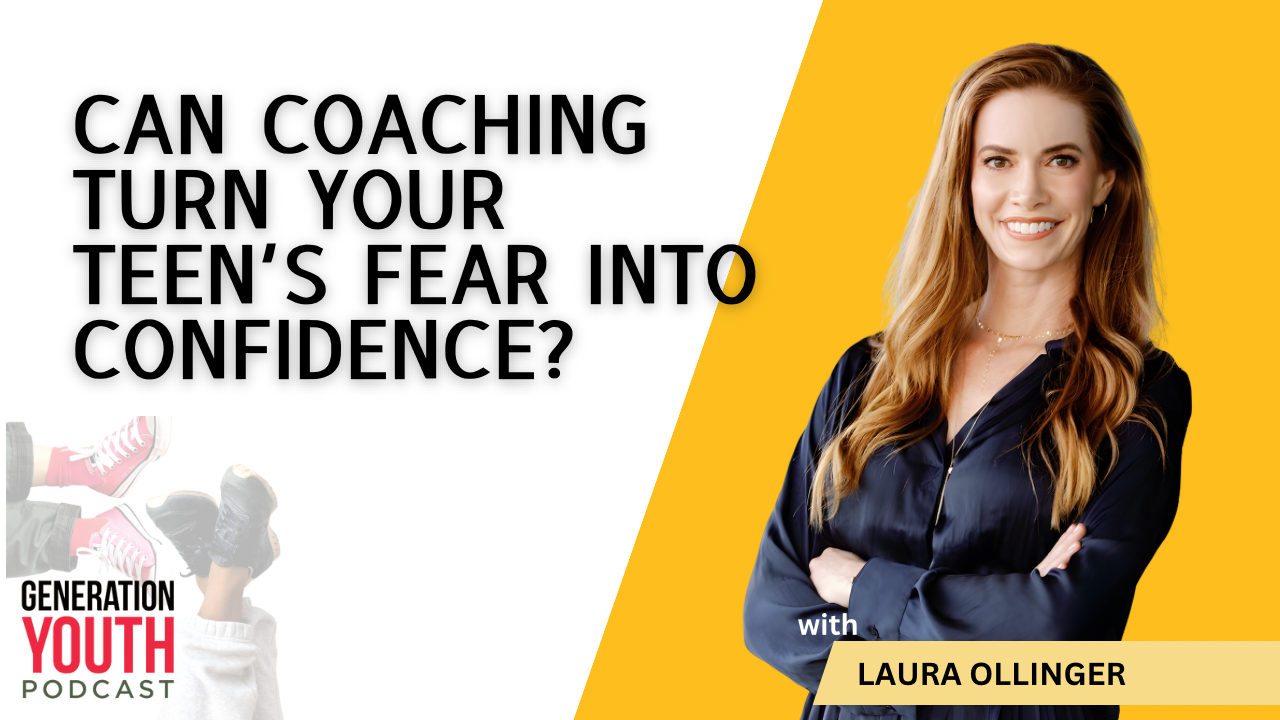Unlocking Youth Confidence: How Coaching Helps Teens (and Parents) Thrive in a Fast-Changing World
Oct 24, 2025
Certified youth coach Laura Olinger joins the Generation Youth Podcast to unpack how coaching can help teens overcome fear, anxiety, and self-doubt—while giving parents the tools to better support their child’s growth.
Facing the Fear Factor
Let’s be honest—today’s teens are growing up in one of the most pressure-filled times in history. Between social media comparison, academic stress, and a constant fear of judgment, many young people are wrestling with anxiety that runs deep.
In this episode of the Generation Youth Podcast, I sit down with youth and parent coach Laura Olinger to talk about what’s really going on behind the scenes in a teen’s mind—and how coaching can make a lasting difference.
“The biggest fear teens have today,” Laura explains, “is being judged or rejected by their peers or even their family.” That fear quietly drives so many decisions—how they act, who they hang out with, and even what they believe about themselves.
And here’s the tricky part: most of it happens below the surface. “We have something like 70,000 thoughts a day,” Laura shares. “They’re like background programs running in your mind.” Coaching helps bring those hidden scripts to light—so teens can challenge the stories that are holding them back and start writing new ones.
Coaching vs. Therapy: Understanding the Difference
One of the biggest misconceptions about coaching is that it’s the same thing as therapy. While there’s some overlap, they serve different purposes. Therapy often looks backward—it’s about healing, processing, or addressing trauma. Coaching, on the other hand, looks forward.
As Laura puts it, “Therapy may focus on what went wrong. Coaching helps you discover what’s possible.”
I often tell parents that therapy helps you deal with what’s holding you back; coaching helps you move toward what you’re meant to become. It’s about creating a clear path, developing habits, and growing confidence through consistent action.
That’s why coaching connects so well with positive psychology—it’s not about “fixing” teens, but about helping them flourish.
The Coaching Process: Small Wins, Big Change
One of the things I love about Laura’s approach is how practical it is. Coaching isn’t about pressure—it’s about progress.
“We ask questions that help teens find their own solutions,” she says. “When they take a small step—like making their bed or introducing themselves to someone new—it triggers a sense of pride and motivation. That’s how change starts.”
Every small victory matters. Laura shared stories of teens who overcame performance anxiety, built new friendships, and learned to take ownership of their growth. Even traits like confidence or resilience—though hard to measure—can be tracked and strengthened through intentional coaching conversations.
Why Parents Are a Key Part of the Journey
Here’s something many people overlook: youth coaching impacts parents just as much as teens.
Laura meets with parents once a month—not to break confidentiality, but to align support. “Most parents come to help their teen,” she says, “but end up realizing they have growth areas, too.”
And that’s powerful. When parents shift from “command mode” to “coaching mode”—offering options instead of orders—communication opens up. Families reconnect. Conflicts decrease.
As I shared during our conversation, “When a youth coach works with a family, the impact naturally extends to the parent. And that’s often where the deepest transformation happens.”
Why Coaching Matters More Than Ever
Years ago, every teen had built-in mentors—teachers, pastors, or family friends who guided them through tough seasons. But in today’s fast-paced, digital world, that kind of consistent mentorship is harder to find. Coaching fills that gap.
Laura describes it beautifully: “In many cultures, there’s always been a third-party guide to walk alongside young people. That’s what coaches do—we give teens a safe space to explore, grow, and build resilience.”
This isn’t just for “struggling teens.” It’s for any young person who wants to grow in confidence, direction, and purpose—and for parents who want to support that growth more effectively.
Final Thoughts: Confidence is a Journey
Empowering today’s youth means more than offering advice. It means giving them tools to think differently, act courageously, and believe in their own ability to create change.
Coaching is that catalyst—it moves teens (and families) from where they are to where they’re called to be.
To learn more about Laura Olinger’s work, visit PositivelyHealthyCoaching.com, or check out the Generation Youth Podcast episode for practical ways to start this journey with your teen.
💬 Ready to help your teen thrive?
Share this blog or podcast episode with a parent or educator who needs to hear it. Together, we can raise a generation that leads with confidence and purpose.



